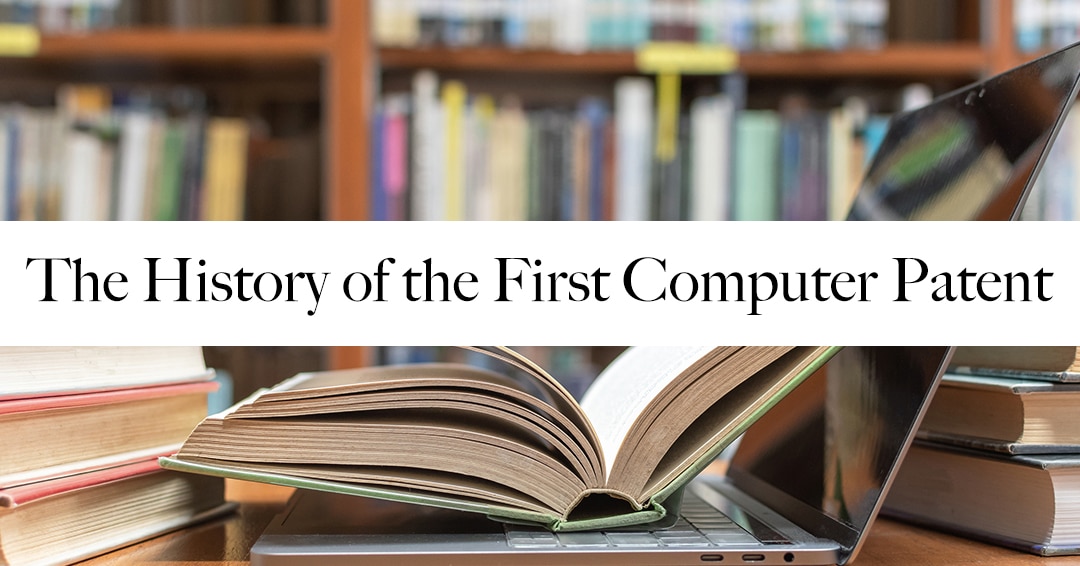Originally posted on November 15, 2023 @ 9:30 am
The emergence of computer technology marked a significant turning point in the annals of human history. Since its onset, it has heralded the dawn of a new age, transforming how we live, work, and communicate!
At the heart of this extraordinary feat is the first computer patent, which laid the foundation for all subsequent advancements in this field. Before delving into the intricacies of this computer patent, it is essential to understand its origins. So, let’s take a deeper look at the birth of computer technology.
The Birth of Computer Technology
The pioneers who paved the way for modern computing deserve recognition for their invaluable contributions to technology. However, who are these pioneers, and how did they achieve such a marvelous feat?
While J. Presper Eckert and John Mauchly officially filed the first ever computer patent in 1947, the roots of computer technology stretch back to 1937. Ten years earlier, Iowa State College professor John Vincent Atanasoff, alongside graduate student Clifford Berry, laid the groundwork for the world’s first computer.
However, to fully understand how their patent changed modern-day society, we need to take a look at the concept of the first computer patent and why it revolutionized the world of technology forever!
The Concept of the First Computer
The first computer was conceptualized as a machine capable of performing complex calculations and executing logical operations. Eckert and Mauchly envisioned a device that could:
- Automate tasks,
- Enhance productivity,
- And surpass the limitations of human capabilities.
The concept of the first computer was not just about efficiency; it was about unlocking the potential of human ingenuity and allowing it to soar to new heights. They foresaw a future where computers could also aid in scientific research, help solve complex problems, and even assist in the exploration of outer space.
Their dream was to create a machine that could not only process data but also understand and learn from it, paving the way for artificial intelligence, which is now a reality. So, how did we get from there to here? Let’s take a closer look at the first computer patent and its impact on answering that question.
The First Computer Patent: What You Need to Know
The first computer patent comprised a comprehensive set of instructions and technical specifications detailing the inner workings of this pioneering invention by outlining the components that formed the backbone of this revolutionary device.
So, to further comprehend the full idea of the first computer patent, let’s take a closer look at the main components that this revolutionary idea was made of:
| The Components of the Patent | Characteristics |
| Central Processing Unit (CPU) | It served as the brain of the computer, which was responsible for executing instructions and performing calculations, including the arrangement of logic gates, registers, and arithmetic units. |
| Memory System (RAM) & Read-Only Memory (ROM) | It served for storing and retrieving data and addressed the scheme and methods for efficient data storage and retrieval. |
| Input/Output System (I/O) | It allowed the computer to interact with the outside world, enabling users to input data and receive output with the use of keyboards and punch cards. |
The first computer patent’s significance cannot be overstated, as it laid the groundwork for subsequent technological advancements in computer science and inspired generations of inventors and innovators.
Furthermore, by patenting their invention, Eckert and Mauchly ensured that their intellectual property was protected, giving them exclusive rights to their creation, which allowed them to commercialize their invention and establish a foundation for further research and development in the field of computing.
Their groundbreaking achievements became a source of inspiration for aspiring inventors, so let’s take a closer look at the impact of the first computer patent and what it did for our modern society.
The Impact of the First Computer Patent
The legacy of the first computer patent continues to shape the landscape of technological innovation, and its profound impact on subsequent inventions and its role in shaping today’s digital age cannot be overstated.
By providing a blueprint for success, the first computer patent also inspired generations of inventors to push the boundaries of what is possible in computer science, leading to the development of increasingly sophisticated technologies.
The Impact on Modern Technology
One notable example of how the first computer patent shaped future inventions is the creation of the microprocessor. Through their tireless efforts, they were able to miniaturize the complex circuitry of early computers, making them more accessible and affordable for everyday use.
Furthermore, it also played a crucial role in the development of artificial intelligence (AI). Today, AI technologies are integrated into various aspects of our lives, from voice assistants like Siri and Alexa to self-driving cars and advanced medical diagnostics.
In today’s digital age, its legacy can be seen in every aspect of our lives, from the smartphones we depend on to the complex algorithms that power our daily interactions. Its impact on society and the economy is immeasurable, shaping the very fabric of our modern world.
The Impact on E-Commerce
The ability to securely process online transactions, which was made possible by the patent’s focus on data encryption and secure communication, has also revolutionized the way we shop and conduct business.
From online banking to global marketplaces, the patent’s principles have paved the way for a digital economy that transcends geographical boundaries. Moreover, the first computer patent’s impact extends beyond the realm of commerce.
The Impact on the Spread of Knowledge
Furthermore, the impact of the first computer patent played a significant role in the democratization of knowledge and information. The patent’s emphasis on data storage and retrieval led to the creation of vast digital libraries, making information accessible to anyone.
This has empowered individuals and communities, enabling them to learn, collaborate, and innovate on a global scale. This has, in turn, done a lot for the technological industry as a whole. So let’s take a look at the impact on the tech industry.
The Impact on Healthcare
Furthermore, the healthcare industry also experienced a profound impact. The first computer patent paved the way for the development of medical imaging technologies, such as CT scans and MRIs, enabling doctors to diagnose and treat diseases with unprecedented precision.
It also facilitated the creation of electronic health records, streamlined patient care, and improved medical research. However, it isn’t only innovation that is at the forefront of this topic. It has also been faced with controversies and legal battles. So, let’s get into it!
The Controversies and Legal Battles of The First Computer Patent
However, the journey to the first computer patent was not without its fair share of controversies and legal battles. As noted innovators, Eckert and Mauchly unfortunately faced a series of disputes and challenges that tested the validity and ownership of their pioneering invention.
Accusations of patent infringement also added fuel to the fire, given that competing inventors and companies claimed that Eckert and Mauchly had copied their ideas and technologies, infringing on their own patents.
Claims of prior work also emerged, with individuals asserting that similar inventions had been made before Eckert and Mauchly’s patent application, which were supported by historical records and documented evidence, making the legal battles even more complex.
Eckert and Mauchly were found to have actually based their ENIAC machine off of the Atanasoff-Berry computer, which resulted in their patent being invalidated by a U.S. District Court in 1973. So technically, one of the world’s most influential inventions is owned by no one.
The aftermath of the legal battles had a profound impact on the tech industry as a whole. The recognition of Eckert and Mauchly’’s patent as the first of its kind set a precedent for future inventors and innovators, establishing a framework for the protection of intellectual property in the rapidly evolving world of technology.
A Refresher about the First Computer Patent
Overall, the first computer patent stands as a testament to human ingenuity and the relentless pursuit of progress. It represents a pivotal moment in history when the foundations of modern computing were laid.
From its inception to its lasting legacy, the first computer patent continues to captivate our imaginations and drive us towards even greater possibilities. And the innovation that has come from this is ever-growing!






